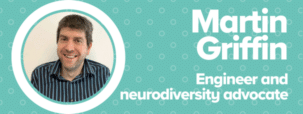Sign up to our mailing list to receive expert advice to help you improve your financial, mental and physical wellbeing, so that you can live well every day. We'll also send you the latest news and updates, and information on how you can get involved with Foothold and support the engineering community.


How our Engineering Neurodiverse Futures programme is supporting students to reach their full potential
Find out how our Engineering Neurodiverse Futures programme is helping neurodiverse aspiring engineers to manage the life skills they need to thrive in their studies.
*This story has been made anonymous at the request of the community member
Juggling all these challenges whilst trying to stay on top of my workload meant I soon started to feel burnt out. I could feel my passion for my studies and future career draining away – even though I’d worked so hard to get to this point in my life.
Hi there, I’m an engineering student studying electronics and computing at Leeds University.
I’ve always believed I am capable of achieving high grades, and up until I started university I had no real trouble performing well academically.
However, when I started my first year of my degree, it wasn’t long before I began experiencing some problems.
I noticed that my fellow students seemed to finish tasks much quicker than me. They also seemed to find most tasks quite easy, whereas I would struggle with even the simplest things.
Generally it felt like I had to work much harder than everyone else, even though I was pretty much doing the same work, which was really frustrating.
I also noticed I often had an overwhelming urge to speak frequently in group settings. I would regularly interrupt people, or talk over them. Not intentionally – I just felt like I needed to share my thoughts at every chance I had, like something was forcing the words to come out uncontrollably. I felt powerless to stop it.
I also had issues with my memory, and would frequently forget routine things that should have come to me easily.
Losing out because of life skills
Juggling all this whilst trying to stay on top of my workload meant I soon started to feel burnt out. I could feel my passion for my studies and future career draining away – even though I’d worked so hard to get to this point in my life. I was also suffering from anxiety, which made everything more difficult than it already was.
What I did realise going through all of this, was that it wasn’t the academic side of my course I was struggling with. It was the other skills I needed to be able to pass my degree – time management, self-organisation, memory, focus. The ‘life skills’ that aren’t really focused on when you’re studying – but which can make the difference between succeeding or failing.
The problem was, they all seemed to have abandoned me when I needed them most. I felt overwhelmed, and didn’t know what to do about it.
Finding Foothold
Luckily, one day I received an email from my university promoting the support that Foothold offers for neurodiverse engineering students and apprentices. I learned that through their Engineering Neurodiverse Futures programme, I could explore the opportunity of getting a diagnosis of a neurodiverse condition.
I had been considering that I might have ADHD or another condition for some time, but I knew it could be really hard to get a diagnosis due to lengthy waiting lists and the costs of private assessments.
I’d also tried asking my GP for help too, but they were unwilling to help me move forward with an assessment.
So I knew that accessing Foothold’s support was really my only option.
It still felt huge to be asking for support, but the fact that they’d be there to support me throughout the process reassured me that I was making the right decision.
It was a like a new door had just opened for me, when all others had been bolted shut.
Applying for the Engineering Neurodiverse Futures programme
Once I began the process, any initial nervousness I had was shortlived. Foothold simplified everything for me, and made me feel really at ease.
The first step was to complete a short online screening test, which came back as positive for potential ADHD.
When I thought about it, I realised I’d probably been living with ADHD for a number of years. I think the rigid structure of school had helped me manage up to this point.
But the changes that came with the unstructured environment of university, and the fact that I started by course under Covid-19 restrictions, had brought out challenges for me that living with ADHD can cause.
I shared the results from my online screening test with my caseworker Rachel. She then arranged for a funded private diagnosis through the Engineering Neurodiverse Futures programme. This was such a huge relief.
I was also given the freedom to choose the assessment provider, which I really appreciated. In the end, I decided on an online assessor as this felt the most comfortable to me.
Learning about myself
I’m still waiting on confirmation of my assessment appointment, and I’m open-minded about the results. But even though I’m only at the start of my neurodiversity journey, the chance to get answers to questions I’ve had about myself for a really long time feels really positive.
I’m already getting some support for my anxiety from my university. If I receive a positive diagnosis for ADHD, I’ll be able to access additional support for my studies too.
It’s also reassuring to know that I might have the opportunity to learn how to master the ‘life’ skills I need to pass my degree, and get my career off to the best start. If my neurodivergence has been contributing to the problems I’ve experienced in this area, learning about it and accessing support will help me manage them better.
Giving me the confidence to achieve the grades I know I’m capable of, and no longer compare myself negatively to my peers.
Why I recommend the Engineering Neurodiverse Futures programme
The Foothold Engineering Neurodiverse Futures programme is a great opportunity for engineering students and apprentices like me. My advice to you if you’re considering applying, is simply to go for it.
The process is so simple, and it will open up new doors for you. When you’re unaware of your neurodivergence it’s easy to tell yourself you’re lazy, or just not working hard enough. But the reality is that you may be having to fight much harder than everyone else to achieve the same goals.
It’s scary to think that I may have gone on for the rest of my life, never knowing, but always wondering. I feel like accessing this support has been a big milestone in my life.
But even if it turns out you’re not neurodivergent, you’ll still learn things about yourself, and get clarity on your situation.
So, don’t turn down the opportunity to access Foothold’s support. I can literally change your life – just like I know it will change mine.
Why I chose to stay anonymous
Something that’s really important to me, is that I’ve been able to keep my situation private. My journey through this process is for me, no-one else, and there’s no pressure to share my results if I don’t want to.
If I receive a diagnosis of ADHD, as it becomes a more natural part of my identity I think I’ll be more comfortable with sharing it. But for now, I’ve asked to share my story anonymously.
This is because I’m concerned that if I disclose my neurodivergence, I may miss out on job opportunities in the future. I wish I didn’t feel this way, and I know that more and more employers are embracing neurodiverse employees, but I still feel there’s some way to go before I and others like me will feel okay with disclosing our neurodiversity.
Hopefully this will change in the future, but for now I hope that reading about my experience has helped you get the confidence to apply for support, or learn a little more about neurodiversity. Thank you for reading my story.
If you’re an engineering student or apprentice and you think you might be neurodiverse, find out more about our Engineering Neurodiverse Futures programme today to see how we can help you achieve your study goals, and reach your full potential.
SUPPORT FOR YOU AND YOUR FAMILY, STRAIGHT TO YOUR INBOX
![Newsletter CTA Banner Graphic [UPDATED] An image showing someone's hands holding a mobile phone. The phone is displaying a version of the Foothold monthly newsletter.](https://www.myfoothold.org/app/uploads/2023/07/Newsletter-CTA-banner-graphic-UPDATED.png)
Blog

Neurodiversity at work: How leaders and managers can support neurodiverse staff to thrive
Neurodivergent engineer Martin shares his some top tips to help leaders empower neurodiverse colleagues to thrive at work.

Working with ADHD: Thriving with FREE Help from Access to Work
Sam shares her experience with Access To Work and how it can help other engineers with neurodiversity.

“Making a meaningful and enduring difference” – your impact in 2022-23
Our CEO Jane shares her thoughts on how your support helped us make a real difference for engineers and their families around the world.